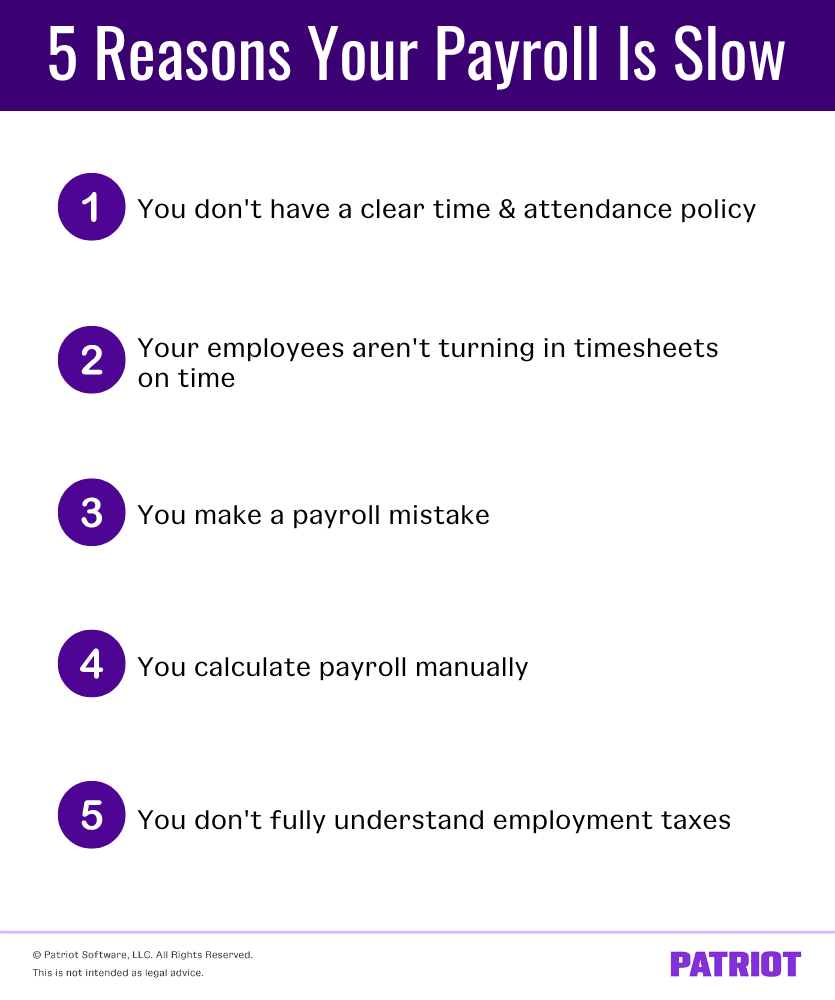As a small business owner, you know things don’t always go according to plan when it comes to payroll. Mistakes happen, and even common payroll tasks can leave you scratching your head. And with mistakes and confusion, time can quickly add up. Have you ever found yourself wondering Why does payroll take so long? Keep reading to find out why it can take so long to run payroll and what you can do about it.
Why does payroll take so long? 5 Reasons
As they say, “time is money.” And the last thing you want to do as a busy business owner is waste precious time running payroll. Whether you use payroll software or do your payroll by hand, running payroll can sometimes take longer than you think. Generally, you may find yourself spending a few extra hours running payroll.
If it’s taking hours instead of minutes to run payroll, it may be time to make a few changes. Want to speed up your payroll process? To go from a snail’s pace to speedy, here are five reasons your payroll process is taking longer than it should.

1. You don’t have a clear time and attendance policy in place
When you realize that payroll is taking longer than it should, check your time and attendance policy. Is the policy clear and concise? Can employees quickly and easily understand it? Your time and attendance policy should include how to:
- Log hours or create weekly timesheets
- Fix mistakes made on timesheets
- Submit timesheets (and when to do it)
If your time and attendance policy is lacking, you may have to spend time making sure that employees log their hours and promptly turn in their timesheets. And, you may have to spend additional time fixing employee mistakes. A clear time and attendance policy can help avoid mistakes before they happen and save you time in the process.
2. Your employees aren’t turning in timesheets on time
If your employees log and verify their timesheets, there’s a chance they don’t submit them on time. Late timesheets can quickly burn through your time (and patience).
Here are some common problems that can lead to late timesheets:
- Employees don’t know the deadline
- Employees don’t understand how to input their information properly
- Employees lose track of time and need reminders about upcoming deadlines
3. You make a payroll mistake
In an ideal work environment, mistakes wouldn’t exist. Sadly, that’s not how business works. Mistakes happen, especially when it comes to payroll. With all your payroll responsibilities, mistakes are bound to happen at some point.
Payroll mistakes may wind up costing you time and causing your payroll process to take hours. Here are some common payroll mistakes you should try to avoid that can quickly burn through your valuable time:
- Classifying employees and contractors incorrectly. You may think the difference between an employee and an independent contractor is clear-cut. But, that’s not always the case. Employee misclassification is no small matter. Depending on the misclassification, you may have to pay both the employee and employer’s portion of taxes (e.g., Social Security and Medicare taxes) and deal with penalties, interest, and back wages.
- Misclassifying exempt workers. Knowing the difference between nonexempt and exempt employees is integral to keeping your payroll process as smooth as possible. Nonexempt employees can earn overtime wages, while exempt employees can’t. If you accidentally classify an employee as exempt, they may miss out on overtime wages. How does this make your payroll process take longer? You’ll owe back wages for the overtime and may have to pay fines and penalties.
- Miscalculating overtime wages. When nonexempt employees work over 40 hours in a workweek, you must pay them overtime wages. The Fair Labor Standards Act (FLSA) requires overtime pay to be 1.5 an employee’s regular pay rate. However, some states and cities have different guidelines for overtime. But, what happens if you miscalculate overtime or overlook state and city guidelines? You guessed it—back wages and the additional complications of penalties and interest.
- Using the wrong tax rates. Taxes can change every year. That bears repeating: tax rates can change every year. If you aren’t up-to-date on current tax rates, you may have to deal with late fees, penalties, and interest on taxes.
- Using an incorrect payroll frequency. Your state may have requirements for when you pay your employees. Check in with your state payroll frequency laws to make sure you pay your employees correctly. Incorrect payroll frequency may result in penalties and fines.
4. You calculate payroll manually
If you run payroll manually, there are plenty of steps to worry about in your payroll process. Making sure that each step is correct can take some time.
Here are some of the items you’ll have to double and maybe triple-check:
- Wages
- Employee hours
- Tips
- Overtime pay
- Deductions
- Contributions
- Payroll and employment taxes
When you run payroll by hand, remember that these numbers can change depending on employee hours. Double-check your calculations before finishing up payroll for the period to avoid any issues.
5. You don’t fully understand employment taxes
Employment taxes, like federal income and state unemployment (SUTA) taxes, are tricky. Period. They already take plenty of time to understand and calculate correctly. And if you’ve made a mistake, employment taxes may have you burning the midnight oil.
Common problems when filing employment taxes can include:
- Miscalculating employment taxes
- Not understanding current rates
- Not knowing your responsibilities as an employer
- Overlooking employment taxes at the state or local level
When you don’t understand employment taxes, it’s easy to withhold too little or too much. If you make a mistake, you’ll have to spend extra time correcting employment taxes.
How to make payroll a breeze
If you want to speed up your payroll process, consider using payroll software to streamline and organize your payroll.
Some of the key features to look for in a payroll software provider include:
- Employee portal. Employees can access pay stubs, pay history, and their W-2s through an employee portal. They may also be able to input and verify hours and types of pay (e.g., paid time off, sick leave, etc.)
- Time and attendance integration. Time is money, and there’s no reason payroll software should keep them separate. Integrating time and attendance into your payroll process helps save time and avoid headaches.
- Full-service payroll. With full-service payroll services, the software provider collects, deposits, and files federal, state, local, and year-end payroll taxes so you don’t have to. Just because your payroll software files and deposits appropriate taxes doesn’t mean they are accurate. Some providers also guarantee their accuracy.
- Customer support. The importance of customer support can change rapidly. If things are going smoothly, customer support doesn’t seem important. But customer support quickly becomes the most important feature if you need help with your payroll software. Good customer service is accessible, knowledgeable, and happy to help.
Looking for payroll software that integrates time and attendance and HR? Patriot’s payroll software can import employee hours and makes payroll as easy as 1-2-3. If you want to save even more time, our Full Service Payroll collects, files, and deposits federal, state, and local taxes. Why wait for a pain-free payroll? Try a free trial today.
This is not intended as legal advice; for more information, please click here.





